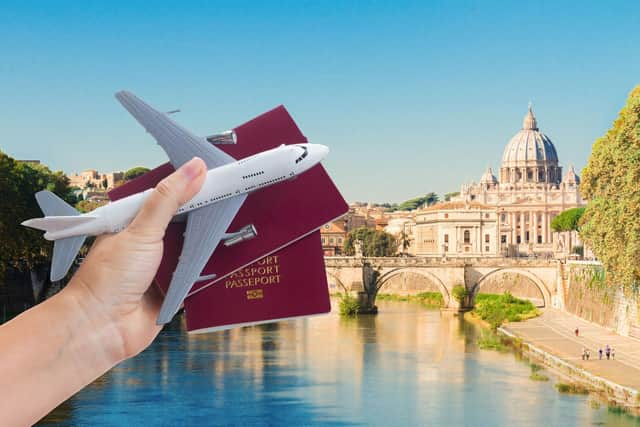Amber list countries: What countries are on Scotland's Amber List and can you travel to them?
A ‘traffic light’ system has been introduced, with those travelling to the 12 countries on the Green List, including Portugal and Iceland, not requiring to quarantine on their return to Scotland
But in recent days there has been conflicting advice on who can travel to Amber List countries and for what reason.
Advertisement
Hide AdAdvertisement
Hide AdHere we look at what the Amber List is, what countries are on it, and what the current advice is for visiting them.


What is the Amber List?
The Scottish and UK Governments have broken the world into red, amber and green countries depending on what risk there is of travellers arriving in the UK with coronavirus and spreading new strains that may extend the pandemic. Currently both lists are the same but Nicola Sturgeon has indicated this may change in the future.
Trips to Green List countries for leisure purposes are allowed, but travellers still need to take a coronavirus test before and after their journey. There is a complete ban on people going to a Red List country for leisure purposes and those arriving from one must book a stay in a pricey quarantine hotel for 10 days.
The vast majority of countries are on the Amber List – including most popular European destinations, the USA and Canada – meaning travellers must self-isolate in their own homes for 10 days on arrival to the UK.
What other rules are there for arrivals from Amber List countries?
Aside from the 10 day self-isolation period, those arriving from an Amber List country must complete a passenger locator form, take a coronavirus test before travelling, and book (and pay £170 for) a coronavirus travel test on the second day and eighth day of their isolation.
You must book these testing kits using the online CTM Booking Portal – the free lateral flow tests or those offered by private comanies are not acceptable.
Can I go on holiday to an Amber List country?
There is no law that says that you cannot go on holiday to an Amber List country.
However, the Scottish Government advice states: “You should think carefully before booking travel to a country or area on the amber list for holidays or for any other leisure purpose. Travelling abroad carries a risk of bringing new cases and variants of COVID-19 into Scotland.”
Advertisement
Hide AdAdvertisement
Hide AdAnd today Prime Minister Boris Johnson advised that people should not holiday in countries on the list, but refused to legislate against it.
Meanwhile, Nicola Sturgeon said: “We still intend to be highly cautious on international travel, given the risk of new variants, but we consider that the situation now allows us to begin a careful move away from blanket restrictions on non-essential travel. Everyone should think seriously about whether they really need to travel abroad this summer. I know for many people international travel is about family connections. But when it comes to holidays abroad, my advice continues to be to err on the side of caution and to staycation this summer.”
What countries are on the Amber List?
The countries and territories on the list are as follows: Afghanistan, Akrotiri and Dhekelia, Albania, Algeria, Andorra, Anguilla, Antigua and Barbuda, Armenia, Aruba, Austria, Azerbaijan, The Bahamas
Bahrain, Barbados, Belarus, Belgium, Belize, Benin, Bermuda, Bhutan, Bonaire, Sint Eustatius and Saba, Bosnia and Herzegovina, British Antarctic Territory, British Indian Ocean Territory, British Virgin Islands, Bulgaria, Burkina Faso, Cambodia, Cameroon, Canada, Cayman Islands, Central African Republic, Chad, China, Comoros, Congo, Cook Islands, Costa Rica, Côte d’Ivoire, Croatia, Cuba, Curaçao, Cyprus, Czech Republic (Czechia), Denmark, Djibouti, Dominica, Dominican Republic, Egypt, El Salvador, Equatorial Guinea, Eritrea, Estonia, Fiji, Finland, France, French Polynesia, Gabon, The Gambia, Georgia, Germany, Ghana, Greece (including islands), Greenland, Grenada, Guadeloupe, Guatemala, Guinea, Guinea-Bissau, Haiti, Honduras, Hong Kong, Hungary, Indonesia, Iran, Iraq, Italy, Jamaica, Japan, Jordan, Kazakhstan, Kiribati, Kosovo, Kuwait, Kyrgyzstan, Laos, Latvia, Lebanon, Liberia, Libya, Liechtenstein, Lithuania, Luxembourg, Macao, Madagascar, Malaysia, Mali, Malta
Marshall Islands, Martinique, Mauritania, Mauritius, Mayotte, Mexico, Micronesia, Moldova, Monaco, Mongolia, Montenegro, Montserrat, Morocco, Myanmar (Burma), Nauru, Netherlands, New Caledonia, Nicaragua, Niger, Nigeria, North Korea, North Macedonia, Norway, The Occupied Palestinian Territories, Palau, Papua New Guinea, Pitcairn, Henderson, Ducie and Oeno Islands, Poland, Réunion, Romania, Russia, Samoa, San Marino, Sao Tome and Principe, Saudi Arabia, Senegal, Serbia, Sierra Leone, Slovakia, Slovenia, Solomon Islands, South Korea, South Sudan, Spain (including the Balearics and Canary Islands), Sri Lanka, St Kitts and Nevis, St Lucia, St Martin and St Barthélemy, St Vincent and the Grenadines, Sudan, Sweden, Switzerland, Syria, Taiwan, Tajikistan, Thailand, Timor-Leste, Togo, Tonga, Trinidad and Tobago, Tunisia, Turkmenistan, Turks and Caicos Islands, Tuvalu, Uganda, Ukraine, United States (USA), Uzbekistan, Vanuatu, Vietnam, Wallis and Futuna, Western Sahara and Yemen.